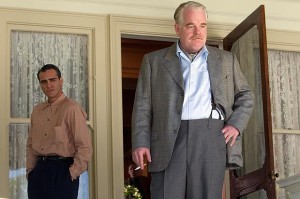
As an artist whose reputation as one of America’s great working directors has been fully earned, Paul Thomas Anderson stands as one of my favorite directors. I’ve enjoyed all of his films, and his Boogie Nights (1997) remains — warts and all — as one of my favorite movies of all time. So it’s especially unfortunate that I must say that his latest, The Master, comes across as a bit disappointing. This isn’t to say that it’s a bad film by any means — it’s just as flawlessly and assuredly directed as anything in his oeuvre, and there are few filmmakers today who can match his technical skills behind a camera. No, the problem with The Master is that Anderson has no designs on entertaining his audience.

This is easily his most mysterious, dense and impenetrable film — one that gives little in the way of answers. It’s an approach he toyed with in There Will Be Blood (2007), but even that film — like the ones that came before it — ended in a climactic release. With The Master, we get hours of bluster and a little rage before the film just confoundingly peters out. And even as the credits roll, there’s a sense that Anderson has made a point — though the question becomes what that point is because it certainly isn’t spelled out, and is left, almost willfully, open to interpretation. For some, all the smoke and mirrors will make the film seem more profound than maybe it is. For others, it’ll be total hogwash. Unfortunately, I’m not sure where the film lies in between those two extremes, though, after one viewing, I’m willing to give a filmmaker as intelligent as Anderson the benefit of the doubt. Though there’s the chance that after viewings two or three I won’t be as generous. I have no clue how it will age, or be regarded in the future

The early word on the film had been that this would be Anderson’s tract on the early days of Scientology, substituting that religion’s founder L. Ron Hubbard with a fictionalized version named Lancaster Dodd (Philip Seymour Hoffman). But The Master is as much about Scientology as There Will Be Blood is about oil, or Boogie Nights is about pornography. Instead of Scientology, the film centers on Lancaster and his tight knit — yet volatile — relationship with our protagonist, Freddie (Joaquin Phoenix), a World War II naval vet with severe anger, violence, mental health issues and all kinds of issues with women. Lancaster, the charismatic leader of a cult, who’s full of crackpot and farfetched theories, decides to take in Freddie and ultimately cure him. Much of their relationship involves Lancaster viewing himself as Freddie’s “master,” despite the fact that they both might just be equally unhinged, with Lancaster better at putting on a public face and better acclimated to civilized life. In many ways, Freddie takes on the characteristics of a wild animal — savage, ill-mannered, yet loyal to Lancaster. The question the plot sets up and the end of the films raises is whether or not Freddie has become his own master, or if he’s just been house-trained. And this is the question Anderson refuses to answer for the audience.

The problem with much of The Master is that there’s no one to really root for, and there’s definitely no reason to like any of these people. Sure, there’s bits of Anderson’s deadpan sense of humor, but there are no agreeable characters here. Freddie is uncouth and angry, while Lancaster is often smug and obviously a liar. Even There Will Be Blood — which was about a greedy sociopath in Daniel Day Lewis’ Daniel Plainview — had an appealing main character, though that might say more about Day Lewis’ innate amiability as an actor when put up against Hoffman and Phoenix. Despite these shortcomings, it’s still a film well worth watching, deserving of the attention it’ll get and by a director who should to be paid heed. If The Master’s biggest sin as cinema is that it doesn’t quite live up to admittedly lofty expectations, then that’s not too shabby. Rated R for sexual content, graphic nudity and language.




“dense and impenetrable film”
“hours of bluster and a little rage before the film just confoundingly peters out”
“there
Okay, I understand these comments, and having watched two trailers for the film, none of this is surprising. What is surprising, however, is giving it 4.5 stars.
Because “it
Ive been warned there is graphic nudity.
I did note those views, of course. To me, they make sense from the perspective of a film review or ardent fan of the director, but for the averate movie-goer looking to be entertained for a couple of hours, maybe not so inticing.
Well, they came from a film reviewer and self-confessed ardent fan.
Twice as nice.
Ive been warned there is graphic nudity.
Warned or promised?
I did note those views, of course. To me, they make sense from the perspective of a film review or ardent fan of the director, but for the averate movie-goer looking to be entertained for a couple of hours, maybe not so inticing.
I’m not sure who, exactly, we’re reviewing movies for, but I feel confident that it’s not the “average” movie-goer. Without getting into yet another discussion on the unfortunate side effects of the star rating system, I’d like to think we’re reviewing movies for people who take the time to read what we have to say, without having it spelled out to them. Knowing you from here, and seeing that you did originally pick up on my points, I’d lump you into that category.
But any average Joe who goes to the Master based solely on 4.5 stars and nothing else is kind of getting what he or she deserves.
“any average Joe who goes to the Master based solely on 4.5 stars and nothing else is kind of getting what he or she deserves.”
No doubt about that. Your points make correct, I believe. I guess that given the commercial success of such fare as the Transformer films, Resident Evil series and the general proliferation of mindless but visually impressive rock ’em, sock ’em movies, the ‘average’ movie goer has changed from earlier times. A lot, it seems to me.
Ive been warned there is graphic nudity.
Yes, there is full-frontal female nudity, though it’s more a matter of quantity than graphic nature.
What exactly makes nudity graphic or not? “Reveals Miss Helen Mirren full frontal in a scene longer than the normal glimpse”?
Just finished rewatching There Will Be Blood and I still can’t bring myself to love it (though I respected it more this time around). From the sounds of things, The Master might be a repeat of that experience.
That was exactly my take on it; I appreciated it as a work of cinematic art, but could not warm up to it and would be unlikely to watch it again. I had a similar reaction to Gangs of New York.
I actually liked There Will Be Blood, but Anderson seems overall to be on a track I feel about much as I feel about most 20th century Scorsese — great movies about things I don’t have much interest in.
Pretty good stuff. I actually thought PSH’s portrayal of Dodd was more convincing and realistic than that of Freddie, in spite of JP’s “method” acting. I also loved Amy Adams’ wicked and driven power-behind-the-throne wife. She is far more than just a pretty face!
I do wish the film had explored a little more deeply Dodd’s (i.e. L. Ron Hubbard’s) exploitation of the generation traumatized by a world war with his (their) ego-driven bastardization of Freudian psychoanalysis. John Moore’s criticism at the dinner party touched on this, but I feel it deserved more attention, and may have livened the movie up a bit.
I wonder if any local Scientologists will react as negatively to this as disciple Tom cruise is reported to have done.
Excellent review, Justin. My thoughts exactly. I have to write a review of this film for my local paper, and I don’t know where to begin. I also feel that I must see it a second time before I write about it. One thing is for sure: after the screening last night, I was up very, very late thinking about it. It was so frustrating, but I couldn’t shake it. The more I process it, the more I “get” it.
After seeing it i guess the graphic part could be old and not very attractive nudity.
Ken I thought you were more of a fan of later Scorcese than eariler periods?
I don’t think ive seen a better scene than the “don’t blink” process scene in at least a couple of years.
“…we get hours of bluster and a little rage before the film just confoundingly peters out…”
Isn’t this how most people (except for a select few “true believers”) respond to cults of personality, fads, newfound religious/belief systems, etc.? There is initial euphoria, maybe some push-back as former “sins” reassert themselves, a “breakthrough” conversion experience, a fanatic desire to proselytize, then something provides the pin that pops the balloon and the subject collapses exhausted, betrayed and demoralized. The end result is a newfound realization of the cult/fad’s disingenuousity, albeit with an accompanying nostalgia for the short-lived (false) sense of salvation.
While not the ideal formula for filmatic entertainment (and certainly not following the patterns of plot development we learned in English 101) I think Anderson’s plot structure follows the messy, imperfect way that such experiences actually unfold in real life.
“I think Anderson’s plot structure follows the messy, imperfect way that such experiences actually unfold in real life.”
I was mulling this same thought as I read through the review and comments. I view Dodd’s fascination with Freddy as one of unrequieted master-ship….and an inner challenge to conquer his demons for fun or profit.It looked a bit cat & mouse to me. Psychopathy is all about winning at any cost…and this is what Dodd is after. He surrounds with the vanquished or the folks like his wife who can assist in achieving that triumph and the future vanquished.
Given how gullible many folks are (Scientology, Jim & Tammy Faye Bakker, Billy Graham etc) it’s no surprise Dodd (the character) was able to go far in the story with his esoteric b.s.
In the ending it looked like Freddy took off on his own and was about to begin playing some of the games he learned from Dodd.
With the meticulousness to period detail i was waiting for some kind of Paul Kinsey cameo.
Ken I thought you were more of a fan of later Scorcese than eariler periods?
That’s why I equated where Anderson appears to be going with 20th century Scorsese.
With the meticulousness to period detail i was waiting for some kind of Paul Kinsey cameo.
Dropping in a character from Mad Men would hardly be meticulous period detail.
It probably would have taken me out of the film but it might have worked within the film context.
And i didn’t mean literally Paul Kinsey.
Maybe Charles Kinsey?
Naah. He would not have breathed the same air as a quack like Dodd/Hubbard (even though many at the time, and a few now, thought he was a pervert/quack).
You mean Alfred Charles Kinsey, I presume.
The guy who studies human sexuality, yeah.
Good ol’ Kinsey was eventually peer reviewed and discovered to be a fraud who hired convicted child molesters to do his “research”. Basically, his “work” is crap and much of it would be criminally culpable had the statute of limitation not run out. I mean just how do you measure sexual response in a 2 year old? Wiser to leave Kinsey out of discussions of who is or isn’t a fraud.
Pretty sure hes like Madonna and just goes by Kinsey.
Kinsey was eventually peer reviewed and discovered to be a fraud
Without wishing to get into this, not everyone seems to believe in Judith Reisman’s case.
Caught this last night and enjoyed it a great deal more than I expected to from some of what I’ve read around here. The final 15 minutes of the film threw me at first, but as I’ve digested it I’ve grown to appreciate the film in its entirety more and more.
Thematically I felt that the film takes a pretty fascinating route toward some of the same ideas presented in Magnolia. I definitely plan on giving this a second look.